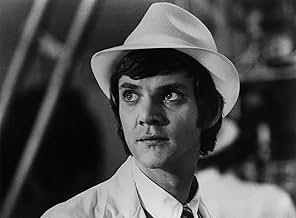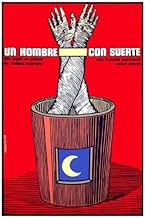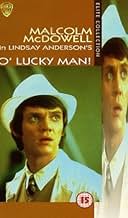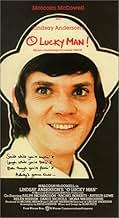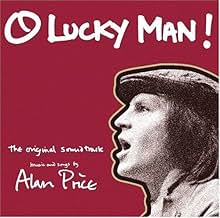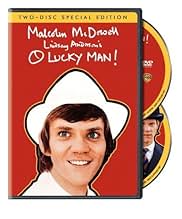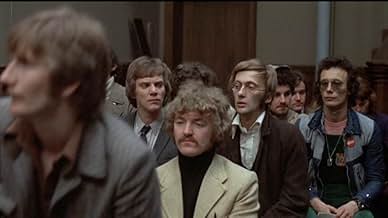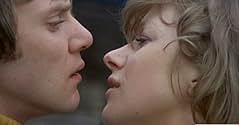AVALIAÇÃO DA IMDb
7,6/10
9,1 mil
SUA AVALIAÇÃO
Adicionar um enredo no seu idiomaAn ambitious coffee salesman has a series of improbable and ironic adventures that seem designed to challenge his naive idealism.An ambitious coffee salesman has a series of improbable and ironic adventures that seem designed to challenge his naive idealism.An ambitious coffee salesman has a series of improbable and ironic adventures that seem designed to challenge his naive idealism.
- Direção
- Roteiristas
- Artistas
- Ganhou 2 prêmios BAFTA
- 3 vitórias e 2 indicações no total
Mary MacLeod
- Mary Ball
- (as Mary Macleod)
- …
- Direção
- Roteiristas
- Elenco e equipe completos
- Produção, bilheteria e muito mais no IMDbPro
Avaliações em destaque
It's always nice to find a worthy film after being a movie watcher for three decades. I remember when this movie was in the theaters. I was a teenager then and didn't go see it. I decided to watch the video and was immediately drawn into this surreal Bunuelish kind of British made movie. Malcolm McDowell is superb as the forever optimistic young coffee salesman. No matter what happens to him, he keeps his good attitude. Don't miss it! But, don't expect absolute narrative
It became my favorite film the day I saw it for the first time, 22 years ago! It still is. I saw it again on video a week ago and here it is, traveling through my brain as a familiar song with constant new messages. Malcolm McDowell and Lindsay Anderson had blown us away with "If..." a couple of years before. But if "If..." was the courting, marriage and honeymoon of two great artists, "O Lucky Man" is a confirmation of a great love story. I know there are a few other members of this menage, David Sherwin for instance or the amazing group of superb British character actors from Mona Washbourne to Helen Mirren but the incomparable presence of McDowell inhabiting Anderson's universe makes this "O Lucky Man" one of the happiest movie adventures of my movie going life. As you may have noticed, I haven't told you anything about the film, I just wanted to share my thoughts hoping to wet your appetite. If you haven't seen it, don't miss it.
This is simply one of my favorite films, and shows that just because the studio system was long dead by the 1970's, that doesn't mean that there aren't plenty of worthwhile classics from that decade and beyond. This movie is unique, and yet to watch it is to see something that was very typical of films in the early 1970's - film trying to reflect in some way upon the world as it exists or is heading. Then came CGI and the cartoonish escapist fantasies that comprise the vast number of films we have today. This film really requires multiple viewings to get it. It basically follows the moral journey of an initially smiling coffee salesman (Malcolm McDowell) as he has his ideals smashed one by one. McDowell was himself a coffee salesman as a young man, and the whole film is from an original idea and script of his very own. I think it does a perfect job of describing the 1970's, which was basically a bridge decade between the idealistic 1960's and the "If it doesn't contribute to the bottom line then it's expendable" mode of thinking that began in the 1980's and just gets more entrenched as time passes. This film isn't for everyone, and although the two movies have completely different story lines, I'd say if you liked "Harold and Maude" you'll like this one too.
I have seen both versions (there was an edited version in the late seventees that did not include the rescue scene) of "O Lucky Man" several times. I first saw it in London in the mid seventees as I was very impressed by Lindsay Andersons earlier "If", not to mention a fine performance by Malcolm McDowell. The surreal quality of of Andersons allegorical perspective of life in England at the time was reflected in one of the films great lines, "Try not to die like a dog?" Having seen the film several times since (and turned some friends onto Lindsey Anderson), I was truly surprised at how this film has, not only, not dated, but actually has more relevance now than it did some 27 years ago. England, was about to undergo radical changes in both government and economy. The naivety of the care free sixties was well behind us. Major strikes were frequent. Punk was about to explode onto an exhausted music scene. And, soon there would be a new regime of economic rationalists running the country. The mood and pace of "O Lucky Man" seemed to reflect a sense of innocence lost. Troubled times ahead. A sense of fear and mistrust of the prosperity that is so often associated with capitalism and free enterprise. There are even blatant stabs at genetic engineering. But most of all the sense that England was no longer in control of it's own destiny. Through out this vision of uncertainty are some of last centuries finest comic performances. Most notably Aurthur Lowes' 'Dr. Munda' was, and still is, brilliant. WARNING!!! Even though this film does not follow the normal codes and conventions of narrative structure, my next comment is about a scene towards the end of the film. So, if you have not seen "O Lucky Man", but would like to, stop reading now. The best line of all that sums up the mood of this film is delivered by Mick Travis during the audition scene. After being slapped in the face by Lindsay Anderson when he was told to 'smile', he looks straight at the camera, sneers, and says, "What's there to smile about?". All these years later, still brilliant.
10miloc
This remarkable, often overlooked film deserves a higher critical reputation than it has largely received. It represents a blossoming of the themes introduced in "if..." (the previous film in Anderson's trilogy) and a playful, even strangely upbeat reworking of those ideas.
"if..." was an explosion of the subconscious, repression fermenting into fantasized revolution; in "O Lucky Man!" the repression has matured into deep, abiding social, political, and economic corruption-- but the fantasies have matured as well. Mick Travis's journey through early '70s England features calamity after calamity, atrocity piled onto atrocity, but it feels lighter than air. It rises like a joke-filled balloon. That vantage point gives the viewer the two advantages unavailable to Travis: wisdom and perspective, and the film's humor comes from the distance between us and the characters scurrying below. (But the film is not, I think, cynical; the road to enlightenment may be hard one but the film makes it clear that it's not unreachable.)
Surrounding Malcolm McDowell's indefatigable Candide of a hero, the supporting cast flows in and out of their multiple roles like a comic repertory company, in which the same actors show up in scene after scene shuffled into a new assortment of scoundrels, con-artists, victims and sages, climaxing (don't worry, I'm not going to spoil it) in a beautiful, subtle joke which has to be seen to be understood.
From the silent-movie pastiches through Price's terrific songs (the music is used admirably) through wild, spontaneous moments of parody, uninhibited symbolic flourishes, and a few small scenes of genuine poignancy, "O Lucky Man!" deserves to be recognized as one of the great films of the 1970s, and perhaps of all time. It's certainly one of my personal favorites. Movies, I think, though bigger than ever, have become smaller and smaller at heart; more films should have the ambitions this film does and deliver on so many of them.
"if..." was an explosion of the subconscious, repression fermenting into fantasized revolution; in "O Lucky Man!" the repression has matured into deep, abiding social, political, and economic corruption-- but the fantasies have matured as well. Mick Travis's journey through early '70s England features calamity after calamity, atrocity piled onto atrocity, but it feels lighter than air. It rises like a joke-filled balloon. That vantage point gives the viewer the two advantages unavailable to Travis: wisdom and perspective, and the film's humor comes from the distance between us and the characters scurrying below. (But the film is not, I think, cynical; the road to enlightenment may be hard one but the film makes it clear that it's not unreachable.)
Surrounding Malcolm McDowell's indefatigable Candide of a hero, the supporting cast flows in and out of their multiple roles like a comic repertory company, in which the same actors show up in scene after scene shuffled into a new assortment of scoundrels, con-artists, victims and sages, climaxing (don't worry, I'm not going to spoil it) in a beautiful, subtle joke which has to be seen to be understood.
From the silent-movie pastiches through Price's terrific songs (the music is used admirably) through wild, spontaneous moments of parody, uninhibited symbolic flourishes, and a few small scenes of genuine poignancy, "O Lucky Man!" deserves to be recognized as one of the great films of the 1970s, and perhaps of all time. It's certainly one of my personal favorites. Movies, I think, though bigger than ever, have become smaller and smaller at heart; more films should have the ambitions this film does and deliver on so many of them.
Você sabia?
- CuriosidadesThere were approximately thirty takes of the scene where producer and director Lindsay Anderson slapped Malcolm McDowell across the face with a script.
- Erros de gravaçãoA sign says 200 miles to London where Travis is picked up. He has reached there by walking for a while from the military establishment where the explosion took place. The distance even from London to the border of Scotland is 398 Miles.
- Versões alternativasThe original US release was cut by twenty or more minutes, the entire sequence involving the suicidal woman, roughly from Mick's release from prison until he meets the charity tea-wagon lady was omitted. (This included one of Alan Price's songs)
- ConexõesFeatured in Free Cinema (1986)
- Trilhas sonorasO Lucky Man!
Written by Alan Price
Principais escolhas
Faça login para avaliar e ver a lista de recomendações personalizadas
- How long is O Lucky Man!?Fornecido pela Alexa
Detalhes
- Data de lançamento
- Países de origem
- Idioma
- Também conhecido como
- O Lucky Man!
- Locações de filme
- Empresas de produção
- Consulte mais créditos da empresa na IMDbPro
Bilheteria
- Faturamento bruto mundial
- US$ 332
- Tempo de duração
- 2 h 58 min(178 min)
- Mixagem de som
- Proporção
- 1.85 : 1
Contribua para esta página
Sugerir uma alteração ou adicionar conteúdo ausente


